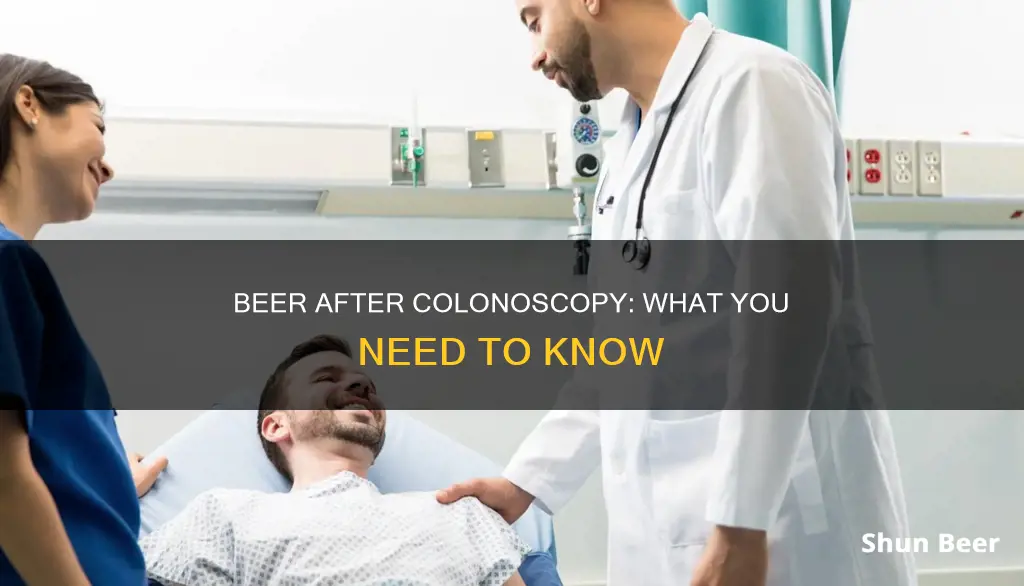
If you've recently had a colonoscopy, you might be wondering if it's safe to drink beer. The answer is that it's generally not recommended to consume alcoholic beverages immediately after the procedure. This is because a colonoscopy can cause your digestive tract to become sensitive, and alcohol can irritate or inflame the delicate tissues and stomach lining. Additionally, the medications given during a colonoscopy can remain in your system for at least eight hours, and alcohol can interfere with their absorption, affecting your recovery. While you may be eager to relax with a cold beer, it's best to prioritize your health and give your body time to recover fully.
What You'll Learn

The procedure makes your digestive tract sensitive
A colonoscopy is a medical procedure that involves inserting a long, thin, flexible tube with a video camera attached into a patient's rectum. This allows doctors to examine the inside of a patient's large intestine (colon) and rectum. It is a routine procedure that can provide valuable insights into a person's digestive health. However, it is essential to follow certain guidelines before and after the procedure to ensure a safe and successful outcome.
One important aspect of post-colonoscopy care is avoiding alcohol consumption. This recommendation is often made because the procedure can cause the digestive tract to become sensitive. The digestive tract, which includes the stomach and intestines, is responsible for converting food and drink into energy and waste. After a colonoscopy, this system is more delicate than usual. Consuming alcohol can irritate or inflame the delicate tissues and stomach lining, hindering the recovery process. Therefore, it is crucial to give the body time to heal before introducing alcohol again.
The sensitivity of the digestive tract after a colonoscopy is primarily due to the nature of the procedure itself. During a colonoscopy, the doctor inserts a thin, flexible tube into the patient's rectum and navigates it through the colon. This process can cause minor irritation or inflammation of the delicate tissues and lining of the digestive tract. As a result, the digestive tract becomes more sensitive to substances like alcohol, which can further aggravate the area.
Additionally, the preparation for a colonoscopy can also contribute to the sensitivity of the digestive tract. Before the procedure, patients are typically advised to follow a specific diet and take laxatives to ensure the colon is clear for examination. This "bowel prep" can lead to dehydration, as the body loses a significant amount of fluids. Alcohol consumption can further exacerbate dehydration, leading to unpleasant side effects. Therefore, it is crucial to focus on rehydration after the procedure, avoiding alcohol, and opting for clear liquids, light foods, and electrolyte-rich drinks.
Furthermore, the medications and anaesthesia used during a colonoscopy can also play a role in the sensitivity of the digestive tract. Anaesthetic drugs can remain in the system for up to 24 hours after the procedure. Consuming alcohol while these drugs are still active can interfere with their absorption and affect the recovery process. It may also interact with prescription painkillers that are often taken after the procedure to manage discomfort. Therefore, it is generally recommended to wait at least eight hours after the procedure, or until the following day, before considering alcohol consumption.
In conclusion, the procedure itself, along with the preparatory steps and medications involved, can make the digestive tract sensitive after a colonoscopy. Consuming alcohol can irritate and inflame the delicate tissues, hinder recovery, and interfere with the effects of medications. Therefore, it is important to follow the advice of medical professionals and allow adequate time for the body to heal before reintroducing alcohol.
Yellowstone Beer: What's on the Menu?
You may want to see also

Alcohol can irritate or inflame the delicate stomach lining and tissues
Additionally, alcohol can alter the composition of intestinal microbiota, leading to an imbalance between beneficial bacteria and pathogenic bacteria in the gut. This bacterial overgrowth can further contribute to inflammation and disrupt the intestinal barrier, allowing pathogens and toxins to enter the bloodstream.
The effects of alcohol on the stomach and digestive system can vary depending on the amount and frequency of consumption. Heavy and regular drinking can make it more difficult for the body to digest food and absorb essential nutrients. It can also increase the risk of developing stomach ulcers, polyps, or tumours. Therefore, it is crucial to follow low-risk drinking guidelines and make necessary lifestyle changes to protect your gut health.
Beer and Kidney Stones: Post-Surgery Drinking Explored
You may want to see also

Dehydration from bowel prep means alcohol is a bad idea
After a colonoscopy, it's important to take care of your body and give it time to recover. Alcohol can wait. Here's why:
Firstly, the bowel preparation for a colonoscopy involves stopping eating and drinking and taking laxatives. These steps can lead to dehydration, and it's well known that dehydration and alcohol don't mix. Alcohol can further dehydrate your body, which is already in a delicate state post-procedure.
Secondly, the medications given during and after a colonoscopy can interact with alcohol. The effects of these medications can last for at least eight hours, and in the case of anesthesia, up to 24 hours. Alcohol can disrupt how your body absorbs these chemicals, affecting your recovery. Sedatives, in particular, are powerful drugs, and too much of them, due to alcohol interaction, can lead to serious health risks and even become fatal.
Additionally, the procedure itself leaves your digestive tract more sensitive, delicate, and prone to irritation. Alcohol is known to irritate and inflame the stomach lining and digestive tract, which is the last thing you want after a colonoscopy.
So, while you may be craving a cold beer, it's best to opt for clear liquids like water, fruit and herbal teas, and juices. Rehydration is key to your recovery, and alcohol will only hinder this process. It's also recommended to stick to light and bland foods that are easily digestible, such as soup, toast, crackers, vegetables, and eggs.
Remember, it's important to follow the advice of your doctor regarding aftercare, and they will provide specific instructions on diet and recovery.
Beer, Chocolate, and Bliss: A Delicious Combination
You may want to see also

Alcohol affects how the body absorbs anaesthetic and painkillers
It is strongly recommended that you do not drink alcohol after a colonoscopy. This is partly because your digestive tract will be more delicate after the procedure, and alcohol could irritate or inflame the tissues and stomach lining. Alcohol also affects how the body absorbs anaesthetic and painkillers.
Anaesthetic and prescription painkillers are often given to patients after a colonoscopy to minimise any discomfort. Alcohol disrupts how the body absorbs these chemicals, which can affect your recovery time and process. Anaesthetic drugs can remain in the system for up to 24 hours after a procedure, so it is recommended that you wait at least a day before consuming alcohol. This is because alcohol can increase the effects of the anaesthetic, which can be dangerous.
Additionally, alcohol can thin the blood, making it difficult for your body to heal and prolonging the recovery stage. It also weakens the immune system, increasing the risk of infection.
Beer Drinking: A Risk Factor for Esophageal Cancer?
You may want to see also

Alcohol-free drinks are also best avoided
It is important to avoid drinking alcohol-free beverages after a colonoscopy. This is because even alcohol-free drinks can contain small amounts of alcohol, which can irritate or inflame the delicate tissues and stomach lining in your digestive tract. This can disrupt the recovery process and cause discomfort.
Alcohol-free drinks can also be dehydrating, which is counterproductive to the rehydration process that is crucial after a colonoscopy. The bowel prep and laxatives taken before the procedure can leave patients feeling dehydrated, and alcohol-free drinks will not effectively replenish these lost fluids.
Additionally, alcohol-free drinks often contain carbonation, which can cause gas and bloating. After a colonoscopy, it is important to avoid anything that can cause discomfort or put pressure on the digestive tract. Carbonated drinks can also be dehydrating, further contributing to dehydration.
Finally, alcohol-free drinks often contain high levels of sugar, which can be difficult for the body to process when it is in a delicate state. Sugar can also feed any remaining bacteria in the digestive tract, potentially causing an imbalance in the gut microbiome.
In conclusion, it is best to avoid alcohol-free drinks after a colonoscopy to allow the body to recover effectively and avoid any discomfort or disruption to the delicate digestive tract. Patients should opt for clear liquids, such as water, fruit and herbal teas, and juices, which will help with rehydration and aid in the recovery process.
Endoscopy and Beer: What You Need to Know
You may want to see also
Frequently asked questions
It is not recommended to drink beer or any other alcoholic beverage after a colonoscopy. This is because your digestive tract will be more delicate after the procedure, and alcohol could irritate or inflame the tissues and stomach lining. It is also important to wait at least eight hours after the procedure to allow the medications you were given to wear off.
During a colonoscopy, a doctor inserts a long, thin, flexible tube with a video camera attached into the patient's rectum to examine their large intestine and rectum. This procedure can make the digestive tract more sensitive, so it is important to avoid anything that could irritate or inflame it, such as alcohol.
It is recommended to wait at least eight hours after the procedure, as this gives your digestive tract time to recover. If you were given any form of anaesthesia, you should wait at least 24 hours, as these drugs can remain in your system for up to a day.
Yes, it is important to focus on rehydration and light, easily digestible foods and drinks after a colonoscopy. Water, fruit and herbal teas, and juices are all good options.







